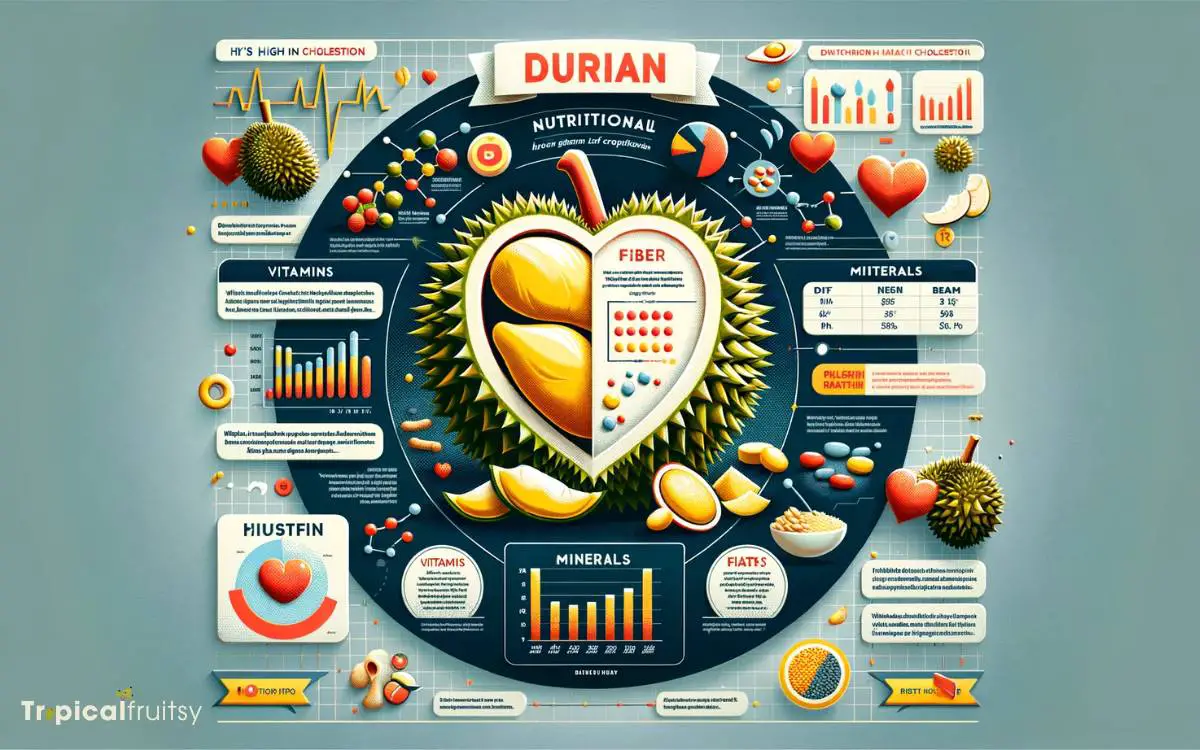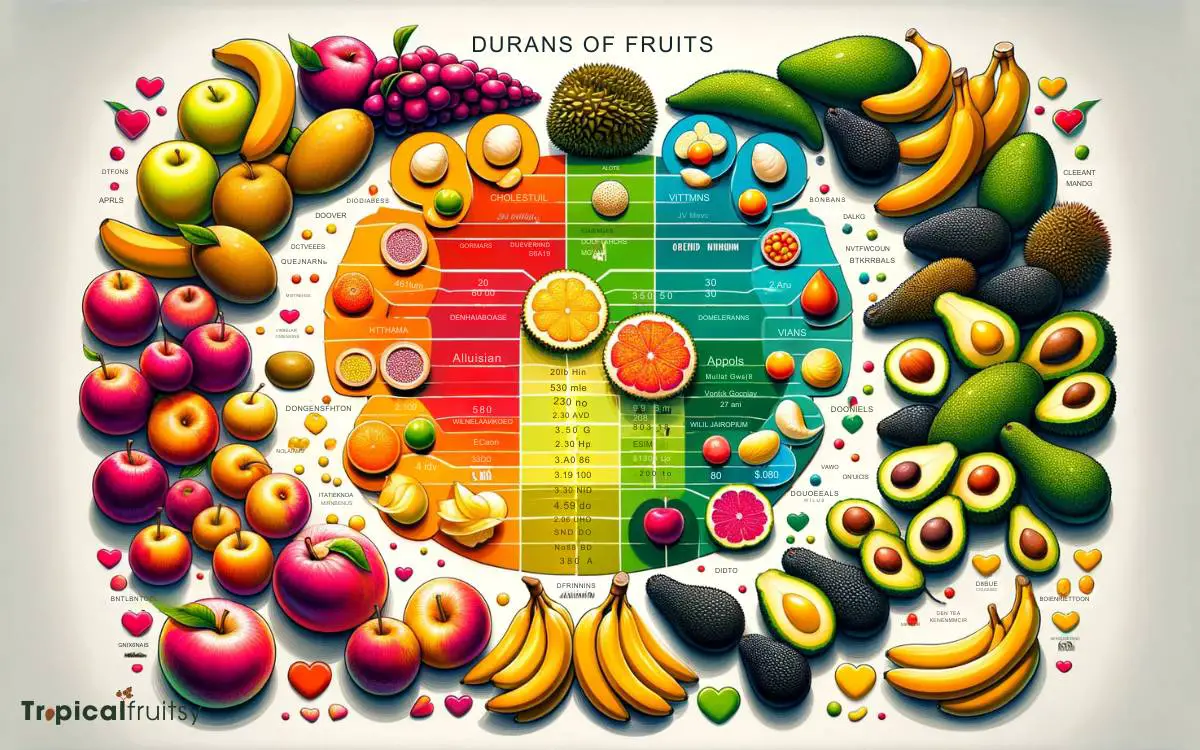Durian Is High in Cholesterol: Debunking the Myth!
No, durian fruit does not contain cholesterol. This tropical fruit is cholesterol-free and is rich in dietary fiber, healthy fats, and various nutrients, which can be part of a balanced diet.
Durian is a tropical fruit known for its distinctive smell and flavor, often referred to as the “king of fruits” in Southeast Asia. Cholesterol is a fatty substance found in animal products, not in fruits or vegetables.
Therefore, durian, like all other fruits, does not contain cholesterol. Despite being calorie-dense and having a high fat content for a fruit, the fats in durian are mostly healthy monounsaturated and polyunsaturated fats.
It’s also a good source of dietary fiber, vitamins C and B, and minerals such as potassium, iron, and magnesium.
Eating durian can provide several health benefits, including:
For those managing their cholesterol levels or following a heart-healthy diet, durian can be a nutritious addition in moderation, given its calorie content.
While durian is a cholesterol-free fruit, its high caloric density means it should be consumed in moderation as part of a balanced diet to maintain overall health.

Key Takeaway
Nutritional Facts Related to Cholesterol in Durian
| Aspect | Description |
|---|---|
| Cholesterol Content | Durian contains 0 mg of cholesterol per 100g serving. |
| Fat Content | Contains about 5g of fat per 100g, higher than most fruits. |
| Type of Fat | Mostly contains unsaturated fats, which are healthier. |
| Dietary Fiber | High in fiber (about 3.8g per 100g), beneficial for digestion. |
| Caloric Content | High in calories (around 147 kcal per 100g). |
| Impact on Blood Cholesterol | Consuming durian in moderation is unlikely to significantly affect blood cholesterol levels. |
Unpacking the Cholesterol Myth

The misconception that durian fruit raises blood cholesterol levels persists despite scientific evidence to the contrary.
Research has indicated that durians contain no cholesterol and the fats present are primarily composed of monounsaturated fats, which have been shown to maintain or even improve blood cholesterol levels.
Additionally, this tropical fruit is rich in dietary fiber, which can facilitate the reduction of low-density lipoprotein (LDL), commonly referred to as ‘bad’ cholesterol.
It is essential to consider that while durian is relatively higher in calories and fat compared to other fruits, moderate consumption within a balanced diet is unlikely to have a detrimental impact on cholesterol.
Health professionals emphasize the importance of overall dietary patterns rather than the effect of a single food item.
Nutritional Profile of Durian

Analyzing the nutritional profile of durian reveals that this fruit is not only cholesterol-free but also a rich source of vitamins, minerals, and dietary fiber.
Its composition is noteworthy for:
Macronutrients:
- High in carbohydrates, primarily in the form of natural sugars
- Contains a moderate amount of fats, predominantly healthy monounsaturated and polyunsaturated fats
- Provides a decent amount of plant-based protein
Vitamins and Minerals:
- Exceptional levels of Vitamin C, known for its antioxidant properties
- Contains B vitamins including folic acid, which is crucial for cell function and tissue growth
- Rich in potassium, aiding in blood pressure regulation and cardiovascular health
- Supplies magnesium, which is important for muscle function and bone health
This comprehensive nutrient mix sets the stage for a detailed examination of durian’s impact on heart health.
Durian and Heart Health

Despite its rich fat content, durian contains no cholesterol, thus posing minimal risk to heart health when consumed in moderation.
Often misunderstood due to its creamy texture and potent aroma, durian is a fruit that is naturally cholesterol-free, like all plant-based foods. Its fats are primarily composed of monounsaturated and polyunsaturated types, which can be beneficial to the cardiovascular system.
However, durian is also high in calories and can contribute to weight gain if overeaten, potentially leading to adverse heart health outcomes.
Therefore, it is essential to enjoy durian as part of a balanced diet. The key is portion control and ensuring a diverse intake of fruits and vegetables, whole grains, lean proteins, and healthy fats for overall heart health maintenance.
Comparing Durian to Other Fruits

While durian is naturally cholesterol-free, its nutritional profile is quite distinct from other common fruits, many of which have lower calorie contents and are less rich in fats.
The following bullet points provide a comparison:
Caloric Content:
- Durian: High in calories, providing about 357 per 100 grams.
- Other fruits (e.g., apples, oranges): Generally range from 50 to 100 calories per 100 grams.
Fat Content:
- Durian: Contains about 13 grams of fat per 100 grams, which is high for fruit.
- Other fruits: Typically low in fat, with most containing less than 1 gram per 100 grams.
This comparison highlights that durian’s nutritional makeup is more akin to that of calorie-dense, fatty foods than to most other fruits, which are primarily composed of water, simple sugars, and dietary fiber.
Best Practices for Durian Consumption

To minimize potential health risks, consumers should moderate their intake of durian due to its high caloric and fat content.
Durian, known for its distinct aroma and taste, is often referred to as the ‘king of fruits’ and can be part of a balanced diet when consumed in moderation.
Despite its nutritional benefits, including high levels of vitamins and minerals, durian is also calorie-dense and rich in healthy monounsaturated fats, which means it should be consumed in mindful portions.
Health professionals recommend incorporating a variety of fruits to ensure a wide intake of nutrients.
For those with dietary restrictions or cholesterol concerns, consulting with a healthcare provider before adding durian to the diet is advisable.
Enjoying durian as an occasional treat rather than a staple can help maintain a healthy and diverse dietary pattern.
Conclusion
Despite common misconceptions, durian fruit does not contribute to serum cholesterol levels and may offer various health benefits. Its unique nutritional profile warrants its inclusion in a balanced diet when consumed in moderation.
With its richness in fiber, vitamins, and antioxidants, durian can be a healthful choice compared to other fruits.
Does not the evidence suggest that durian, often maligned for its cholesterol content, deserves rehabilitation in the court of public nutritional opinion?






